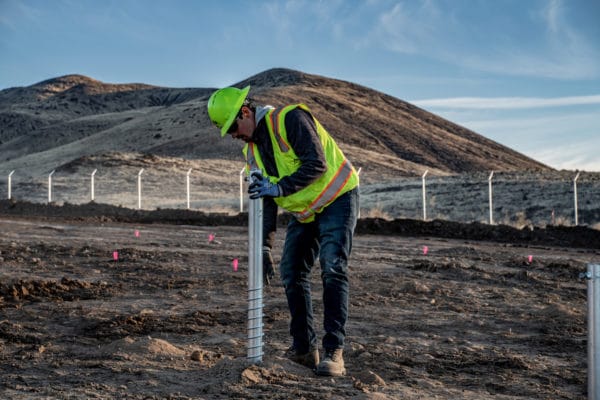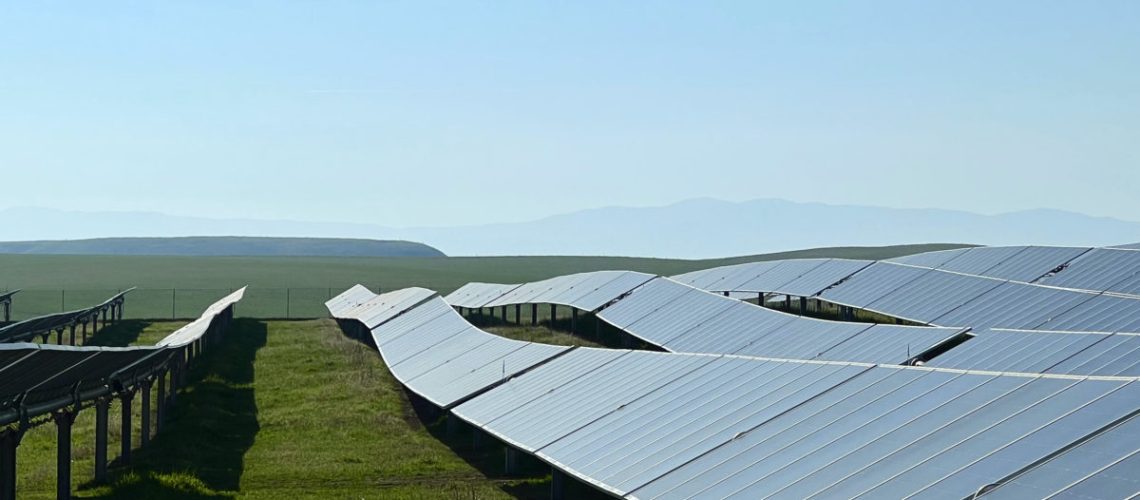Since their introduction into the utility-scale solar market, the name of the game with single-axis trackers has always been about increasing yield and optimizing generation for project owners and PPA off-takers. In the years that have followed, a whole host of solutions have driven up the savings presented by the technology exponentially, with gains up to 35% more than conventional systems, when paired with other breakthrough technologies, like bifacial panels.
Even with all the accomplishments that have been made, you’d be hard-pressed to find anyone in the space who believes that we’ve reached or are nearing the theoretical limit to gains made possible by tracker technologies. Chief among the variables keeping us from realizing this theoretical limit are obstacles that have been around since trackers’ introduction and are only growing more common as the geographic footprint of solar projects expands: high wind, uneven terrain, and interruptions in optimal production, be they expected or unexpected.
Moreover, these phenomenon are not singular in the obstacles they present. For example, high wind can mean sustained gusts over the course of hours – known as static wind loads – or short bursts of incredibly high-speed wind – known as dynamic wind loads. Both can be part of development considerations for a project being installed on uneven ground in wind-prone West Texas.
Since the advent and subsequent adoption of large-format modules, which exacerbate each of these issues via their large surface area and high power output ratings, tracker manufacturers have developed a host of solutions to attack one or more of these issues, each in their own way.
Going with the flow
In March, Nextracker unveiled its NX Horizon-XTR, a terrain-following, single-axis tracker built specifically for projects located on sites with sloped, uneven, and challenging terrain. The product has been seen as a complete overhaul of traditional tracker design. Historically, all trackers in a row have been set to a standard plane, with the piers supporting the tracker and module units being installed at different lengths and depths to achieve that plane while maintaining structural and operational stability.
The NX Horizon-XTR also utilizes adaptive tracking, which allows each tracker row in an installation to operate independently from all of the other rows. Before adaptive tracking, tracker controls were largely on the project-level, meaning that if the angle for one row was adjusted, the angles of all modules across the project were adjusted. This approach would leave a great bit of generation on the table in an installation on uneven terrain, where the optimal angle at any given time can differ greatly between two adjacent modules.
“[Adaptive tracking] allowed a whole range of benefits: we could self power the tracker with a little solar panel, instead of hooking up to the grid, and each row could be independent, meaning you could drive through the system for vegetation management, cleaning, maintenance on solar panels, or during construction,” shared Nextracker CEO and co-founder, Dan Shugar “So if you’re on an if you’re on a hilly site, in the morning and sun’s on the east side, all of your trackers can all be at the ideal angle.”
Another leader in the tracking space, Terrasmart, has taken a different approach to tackling uneven terrain, first taking a close look at the terrain adaptations that make each site unique, before shifting focus to the tracker foundations.
“WFas sihat we are doing is taking a technology or platform agnostic approach,” explained Dean Vukovic, the General Manager of Terrasmart’s ground mount division.” As sites have become a little bit tougher to build on, there might be some preconceived notions about science, geography, wind, snow, or other governing factors there. What we try and do is work with asset owners, developers and EPCs to put forward a neutral approach. If we don’t have a technology base, as this predetermining factor, we can have a full suite of options available at our disposal, and really figure out what the best solution is. It might require a tracker with a certain type of foundations, it might have a certain configuration on a fixed-tilt, or there may be some different engineering calculations we can apply.”
According to Vukovic, her than develop a catch-all solution, Terrasmart deemed it more valuable to ask their partners what their specific needs are in tackling terrain on a project-by-project basis, ultimately leaning on existing solutions and the company’s extensive project modeling and output software to create the ideal, yet unique to that project, solution.
“What we try and do is have an engineer to order approach,” said Vukovic. “There was an interesting example, out in Hawaii not too long ago, where a developer couldn’t get a tracker system to pencil out. Working with them and using some of the custom software that we’ve developed to do some pretty rapid modeling, we ultimately figured out that it wasn’t a tracer that was the best thing for them at all. It was a certain configuration of fixed tilt, with a certain foundation type, and that ended up meeting all the key and core metrics for the project.”

In January, Terrasmart’s Mike Faraone and Chris Lantz outlined how choosing the right ground-mount foundation, i.e. ground screws vs. pile foundations, is key to optimizing a project’s cost and risk profile.
According to the two, ground screws present higher up-front material and construction costs but eliminate 100% of the refusal risk. In the context of project development, a refusal refers to when a pile doesn’t advance 12 inches over 30 seconds or takes more than five minutes to install.
Ground screws can also minimize land grading and slash other civil expenses which, when paired with adaptable racking designed for flexible land use, can deliver reliable returns from unreliable sites.
On the flip side, pile foundations are the standard option for cost-effective PV. From a material and construction standpoint, they can be deployed quickly and reliably — on typical sites. In rugged or sloped terrain or in unpredictable conditions, however, pile foundations can leave your project high and dry, presenting costly and schedule-derailing refusals.
In short, both solutions can pencil and have their own advantages, but without an intricate knowledge f the project site, one can’t be certain which solution will be the best to pursue.



